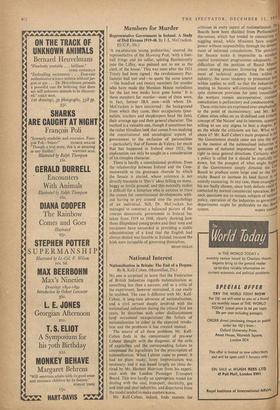National Interest
Nationalisation in Britain: The End of a Dogma. By R. Kelf-Cohen. (Macmillan, 25s.) No one is surprised to learn that the Federation of British Industries regards nationalisation as something less than a success; and as a critic of the experiment, however restrained, it can easily be snubbed. The case is different with Mr. Kelf- Cohen. A long-time advocate of nationalisation, and a civil servant deeply, involved with the nationalised industries during the critical first ten years, he describes with sober disillusionment (a4 occasional exasperation) the failure of nationalisation to usher in the expected revolu- tion and the problems it has created instead.
The source of all these problems Mr. Kelf- Cohen finds in the contentment of pre-war Labour thought with the diagnosis of the evils of capitalism and the corresponding failure to compound the ingredients for the prescription of nationalisation. When Labour came to power, it had no plans ready; hasty improvisation' was necessary, and it was based largely on ideas de- rived by Mr. Herbert Morrison from his experi- ence with the London Passenger Transport Board. This was hardly an appropriate model for dealing with the coal, transport, electricity, gas and iron and steel industries; and departures from the model tended to make matters worse.
Mr. Kelf-Cohen, indeed, firids matters for
criticism in every aspect of nationalisation. The Boards have been shielded from Parliamelltal discussion, which has tended to concentrate .061 niggling detail, while Ministers have accia0 power without responsibility through the develol" ment of informal consultations. The provisia,0 for , finance make it impossible to scrutinise capital investment programmes adequately. 1111 difficulties of the position of Board Meal he' create strong pressures favouring the appals!' ment of technical experts from within t.,f14 industry; the same tendency to promotion fly, within applies to staff, so that the industries '35 tending to become self-contained empires. De spite elaborate provision for joint consultat10; the workers remain uncooperative; consuale' consultation is perfunctory and condescending. These criticisms are expressed over-emphatical to the point of inconsistency; and Mr. gc,l, Cohen often relies on an ill-defined and irritatI.N concept of 'the Nation' and its interests, appear;;',1 willing to use any stigma to beat a dogma. on the whole the criticisms are fair. What to about it? Mr. Kelf-Cohen's main proposal is lita' `the Government should come out into the ogee as the mentor of the nationalised industries 41 questions of national importance' by using the right to issue general directions. Certainly whee.ci a policy is called for it should be explicitly Ial down; but the prospect of what might haPPeni if the Government simply directed the C0,3, Board to produce more large coal or the Eleotw tricity Board to increase its load factor is 114 entirely reassuring. In any case, these examPles e his are badly chosen, since both defects could III corrected by normal commercial operation. Pe!' such questions are to remain subjects of natiotl't policy, operation of the industries as governnleelei departments might be preferable to the 103,,Ir






































 Previous page
Previous page